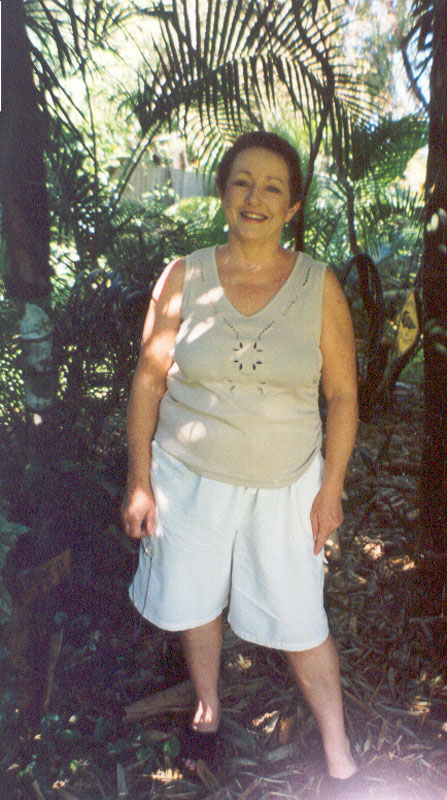15 November 1955 – 15 March 2007
BEGINNING OF BREAST CANCER JOURNEY
In May 1996, I was a 40 year old secondary school teacher with a 10 year old daughter, when I found a lump. The treatment was a mastectomy and immediate tram flap reconstruction, followed by 6 months of CMF chemotherapy. In May 1997, I had a localised recurrence which required day surgery and radiotherapy. Although the breast cancer experience was very demanding, I got on with life and hoped I would be one of the approximate 70% for whom cancer does not return.
DIAGNOSIS OF METASTATIC BREAST CANCER
In June 1999, a sore hip and a persistent cough lead to the diagnosis of breast cancer in my bones and small nodules in my lungs. I took sick leave and had 6 months chemotherapy, this time Epirubicin and Taxotere. I lost my hair, but didn’t have too many other side effects, except fatigue & menopause. I did a lot of reading and decided to ‘embrace’ the treatment and imagine the chemotherapy was full of little pack men, running around my body, gobbling up the cancer. For the past 6 years, I have been on treatment, currently Herceptin, Zometa and chemotherapy. It is tough and inconvenient at times, but I manage the cancer as a chronic illness and generally have good quality of life. I am very much a partner in my treatment and have accessed second opinions 3 times in the 6 years.
ABOUT ME AND MY FAMILY
I realised there was a reasonable amount of formal support for women with early breast cancer, but very little for women with advanced. (This has changed a bit over the past 6 years). I was pretty devastated when I learned metastatic breast cancer had no cure and my life could be considerably cut short. Despite having a very supportive family, I really needed someone to talk to and felt very alone. I looked for help but could not find specialised support for advanced breast cancer. In November 1999, I joined this support group. I have found it particularly helpful to meet and share with other women in a similar position in a safe supportive environment; and I have made (and lost) some wonderful friends.
In October 1999, my partner and I married and our wedding day was fantastic, despite the fact that I was wearing a wig. My daughter and two step-sons and our families and friends attended.
In 2000 I decided to retire from teaching in order to have more time for my daughter who was 13 by this time, my husband, my parents, family and friends; and to do more of the things I wanted to do, such as ‘smell the roses’ and undertake trips in Australia and overseas. My step-sons are now 23 and 26 years old and live in Sydney; and my daughter is flatting and works full-time. She will be 20 soon.
In 2002 I became the voluntary State Representative for Breast Cancer Network Australia (BCNA) and I enjoy promoting the goals of seeking to empower Australians personally affected by breast cancer and improve their care by advocacy, the provision of information and targeted support.
I try hard not to be fearful of the cancer. I once heard Nelson Mandela interviewed about his unjust imprisonment for many years. He explained that his enemies could take away his freedom, but they could not take his mind or his spirit. He said he would have had to give those away and he did not. This struck a cord with me and I determined I would not let the cancer break my spirit; and I would strive to live a happy and purposeful life despite the cancer. I just try to work around it, over it, under it and enjoy the life I have. I try not to regret or fret for what might have been. Of course, I am very lucky to have such a supportive husband and parents.

